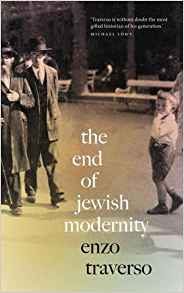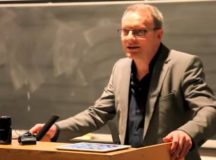This is a sadly disappointing book. At one level, it is yet another example of a widespread failure on the part of many on the Left today to think seriously about and respond to antisemitism. At another, it represents a dismaying regression from the author’s own earlier work. In a valuable study of Marxism and the so-called ‘Jewish Question’ (a formulation Marx himself effectively rejected) and in some interesting essays about the Holocaust and Nazi violence, Traverso had displayed some understanding of the limits of too much conventional thinking on the Left about antisemitism. He recognised that it had had little to say about the Holocaust, which Marxists very largely failed to predict, did not respond to at the time and have written almost nothing of value about since. There are actually one or two important exceptions to this but Traverso has not drawn upon them here. Instead, he has produced a simplistic analysis, which reproduces many of the flaws of a tradition he seems unable either to reflect critically upon or to develop (and of course, as Marx well knew, one needs to do the former work in order to accomplish the latter).
What Traverso asks us now to believe is that antisemitism is no longer a significant phenomenon in the modern world. If there still seem to be some regrettable manifestations of antisemitism today (and even Traverso cannot ignore them completely), they are understandable because of what Jews have now become and how Jews now behave. Conveniently this means that Jews can now, at last, be held responsible for antisemitism, an argument Marx himself vigorously rejected. Jews are now (supposedly) fully integrated. Israel is part of the global power structure, policing the region on behalf of Western imperialism (for there is no other kind). Jewish intellectuals, once at the forefront of critical thought, are now to be found on the side of reaction. Where once there was Leon Trotsky, the heroic advocate of international socialist revolution, now there is Henry Kissinger, the strategic mastermind of American imperial rule.
How, one might ask, has this extraordinary transformation taken place? The answer for Traverso, ironically and paradoxically, lies in the Holocaust, which may have destroyed the Jews of Europe (and therefore its critical intellectuals) but which also ‘burst the abscess of antisemitism,’ bringing an end to antisemitism which, it turns out, had only lasted for two centuries (from about 1750 to 1950, the period Traverso defines as ‘modernity’). The Jewish struggle for integration, long thwarted across Europe, most directly in the east, ambivalently but then explosively in Germany, but even in republican France, has now finally been rewarded, although the price was exorbitantly high. Where Jews were once pariahs, they have now become a fully accepted minority, even the model kind. Antisemitism is now a taboo, as the Holocaust has become a civic religion. Meanwhile the State of Israel, founded in the aftermath of the Holocaust, abuses its memory to justify its uniquely retrograde ethno-nationalism and appalling abuse of the Palestinians.
Who, though, were the great Jewish critical intellectuals, whose loss Traverso so clearly laments? Drawing on Isaac Deutscher’s famous (but also somewhat self-promoting) depiction, he argues that they were all ‘non-Jewish Jews,’ who went beyond the supposed limits of a purportedly narrow Jewish identity, rejecting what they saw as its peculiarly reactionary religion. From Baruch Spinoza to Marx to Sigmund Freud, they developed a sustained and radical critique of the modern world, advancing a compelling internationalist alternative vision of a socialist future free from the nationalist and imperial rivalries which generated the great catastrophes of the 20th century.
That internationalism had one rather obvious blind spot though: it rejected the idea that Jews could have their own nation state. Eager to support national liberation for everyone else, they made a striking and signal exception for Jews. Assimilationists to a man and woman, they believed that antisemitism was becoming irrelevant and that Jews would find all the security they needed inside the socialist societies of the future and would probably (hopefully even) disappear. This argument reproduced an important antisemitic strain in Enlightenment thinking (it is not the only strain of course) that there was something problematic about the continuing presence of Jews in the modern world.
One of the few thinkers to realise this was Hannah Arendt, who Traverso seriously misunderstands. Rather than being an ambiguous figure, unable to fully embrace the radical (actually flawed) internationalism of the non-Jewish Jews, she understood antisemitism much better. She saw that modern antisemitism was both different from earlier forms but also drew on the past. She saw that in an antisemitic world, it is ‘possible to assimilate only by assimilating to antisemitism’. She therefore threw herself at a critical time into the Zionist movement, unlike Deutscher, though he at least had the decency to recognise that he had been gravely at fault in arguing against Zionism.
His willingness to admit he had been wrong was shared by a few others (notably Theodor W. Adorno and Max Horkheimer, not discussed at all here) but has been almost entirely ignored by later generations, who once again tell us that antisemitism is finished. Traverso pretends (in what is a common conceit) that it has been simply replaced by Islamophobia, when it necessary to recognise both what they have in common, and how they differ, and to struggle against both. It is not a zero-sum game. We will not be helped in this urgent task by the absurd pretence made here that the mantle of critical thinking has passed to critics of Eurocentrism in American and British universities, certainly not those whose advocacy of a boycott of Israel shows a dismaying lack of knowledge of the past and the continuing salience of classic antisemitic tropes.
It is sad that Traverso was unable to go further on the reflective and self-critical path he had begun to trace in his earlier work. But that may tell us something about how intellectual history, like history in general, does not proceed in a simple linear way, but is better understood (to use an old term) dialectically, as elements of the past (particularly when they have not been overcome) may be subsumed and reworked, posing new dangers to us all.






































Comments are closed.